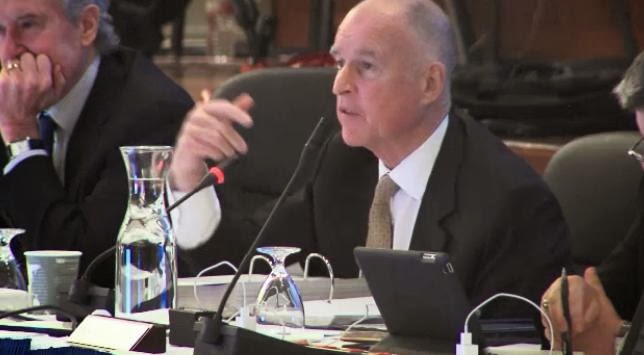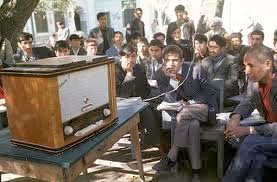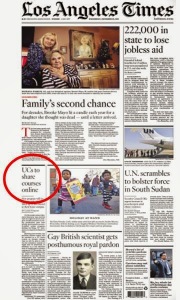Spring break has finally arrived on the UCLA campus, and many faculty are scrambling to move their classes online while sheltering in place and homeschooling their kids in response to the corona virus outbreak. The Council of UC Faculty Associations asked UC President Janet Napolitano to delay the start of spring quarter: Continue reading “Spring Quarter to Start On Time, Online (Updated)”
Category: online education
Jerry Brown Looks for an Online Course that Requires No Human Interaction
At the Regents meeting of January 22, 2014, Gov. Brown seems to be searching for an online course that requires no human interaction. Such a course, he reasons, could have unlimited enrollment because it is completely self-contained. He gets some pushback from UC Provost Dorr, who thinks courses should have such interaction.
You can hear this excerpt at the link below. The entire meeting of the Committee on Educational Policy of the Regents was posted yesterday.
[youtube http://www.youtube.com/watch?v=3tYFLJvrE3g?feature=player_detailpage]
Listen to Part of the Regents Afternoon Session of 1-22-2014
As we have noted in numerous prior posts, the Regents refuse to archive their meetings beyond one year. So we dutifully record the sessions in real time. Below is a link to part of the afternoon session of Jan. 22. This segment is mainly the Committee on Educational Policy. Gov. Brown was in attendance. We will separately (later) provide links just to certain Brown segments. But for now, we provide a continuous recording.
There was discussion of designating certain areas of UC-Merced as nature reserves, followed by discussion of a new telescope. The discussion then turned to online ed and the governor seemed to push for courses that involved no human interaction so that there could be unlimited enrollment. At a later point, Chancellor Block made a comment about the virtue of “residential” education which seemed aimed at the governor’s online push. He talked about a digital divide in which better off students would have traditional in-person classes and poor students would have mainly online offerings. There was discussion of the old Master Plan. Heads of the three segments in the Plan – UC, CSU, and the community colleges – were part of the discussion. Brown indicated that the Master Plan was a political compromise of an earlier era and that it needed to be questioned as to today’s needs.
The president of the UC Students Assn. spoke in support of a larger state budget allocation than the governor was proposing, an oil tax to fund education, divestment from fossil fuels, and other items.
You can hear this portion of the afternoon session at the link below:
MOOCs in the Muck
 |
| Good question! |
Inside Higher Ed today runs an article on MOOC offerings at the U of Texas and Cornell. At the former, there are the usual extremely low completion rates. At the latter, resident students are asking the question in the photo at the right:
…”A year after UT began rolling out nine Massive Online Open Courses, the results are in,” The Daily Texan wrote in a Jan. 29 editorial… Among the “results” are completion rates ranging from 1 to 13 percent, the lack of credit granting courses and the $150,000 to $300,000 production costs… (S)tudents at Cornell voiced similar concerns, arguing that “the administration has not yet outlined how MOOCs will benefit Cornell students.”
MOOc
An interesting analysis of MOOCs in a National Bureau of Economic Research working paper by Stanford economist Caroline M. Hoxby suggests that heavy dependence on online ed won’t work for what she terms highly selective post-secondary educational institutions. In essence, such institutions depend in important ways on alumni loyalty which is hard to obtain if students take courses online that come from anywhere.
Abstract: I consider how online postsecondary education, including massive open online courses (MOOCs), might fit into economically sustainable models of postsecondary education. I contrast nonselective postsecondary education (NSPE)in which institutions sell fairly standardized educational services in return for up-front payments and highly selective postsecondary education (HSPE) in which institutions invest in students in return for repayments much later in life. The analysis suggests that MOOCs will be financially sustainable substitutes for some NSPE, but there are risks even in these situations. The analysis suggests that MOOCs will be financially sustainable substitutes for only a small share of HSPE and are likely to collapse the economic model that allows HSPE institutions to invest in advanced education and research. I outline a non-MOOC model of online education that may allow HSPE institutions both to sustain their distinctive activities and to reach a larger number of students.
Full paper available at http://www.nber.org/papers/w19816.pdf
Whatever happened to the era of limits?
…Sitting in on part of Wednesday’s meeting, Brown challenged regents to develop classes that require no “human intervention” and might expand the system’s reach beyond its student body.
Do They Understand the Key Lesson of Their MOOC?
 |
| Seems like a contradiction! |
To yours truly comes word that Cornell University is offering an online course (MOOC) on American Capitalism.
No problem with that, I guess, but they are giving it away for free. Don’t think capitalism works like that – but what do I know?
Details at https://www.edx.org/course/cornellx/cornellx-hist1514x-american-capitalism-1307
Tops
The governor is to propose his budget for 2014-15 this coming Friday. And although the budget is baked by now, this headline from the LA Now blog of the LA Times can’t hurt as the budget process proceeds between now and June. The guv loves online ed and he can’t give the money to USC. But UCLA would be happy to receive it.
Full article at http://www.latimes.com/local/lanow/la-me-ln-college-online-20140107,0,7388397.story
Nothing like being the top:
[youtube http://www.youtube.com/watch?v=Vc7152gQK-U?feature=player_detailpage]
Events May Divert the Governor from MOOCs, etc., at the Regents in 2014
Jerry Brown will almost certainly be running for re-election in 2014. It doesn’t look like there will be much of a contest but there will be at least some effort devoted to the campaign.
But apart from re-election, Brown is facing some “legacy” problems. During his first iteration as governor, he wasn’t big – to say the least – on grand infrastructure, unlike his father Pat. However, this time around, there is the high-speed rail project and the water tunnel project, both grand and expensive. These projects are analogs to his dad’s freeways and state water project.
The high speed rail is running into problems of financing and negative court rulings. The water project also has financing and environmental obstacles. Currently, dry weather is causing water rationing in the Sacramento area. But it is unclear that the proposed water tunnels would address that issue. Indeed, the drought could raise the issue – very sensitive in the Bay Area – of diverting water to southern California.
Of course, the third legacy of Father Pat was higher ed expansion in the form of the Master Plan. But we are not going to be building more campuses of UC or CSU in the immediate future. And tuition isn’t going up in an election year.
So UC may get a break from gubernatorial attention in 2014. Brown wouldn’t want his rail and other plans to end like this:
Yesterday’s news
Christmas day tends to be a slow news day. However, for those who didn’t see it, the LA Times carried a front page story about UC’s online offerings which allow cross-campus credits. You can find the article at:
http://www.latimes.com/nation/la-me-uc-online-20131222,0,6798231.story
Blog readers will be familiar with these offerings. We noted in a prior post that UCLA seems to be a taker rather than a giver in this endeavor. That is, other campuses’ online courses are available to UCLA students. But UCLA is not offering courses to the other campuses. Berkeley, Irvine, Davis, and Riverside seem to be the offerers.
Now, how about next year’s UC budget, governor? The headline above should make you happy:
[youtube http://www.youtube.com/watch?v=2U-rBZREQMw?feature=player_detailpage]






